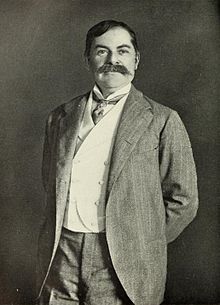Thomas Nelson Page
Thomas Nelson Page (born April 23, 1853 in Hanover County , Virginia , † November 1, 1922 ibid) was an American diplomat and writer , who was best known for the story In Ole Virginia , which was through the local color and dialect African-American southerners.
Page is one of the authors who romanticized the old, slave-like southern states of the USA. He also developed into one of the most influential voices in the United States to hold on to racial segregation. At the beginning of the 20th century, he claimed that the vast majority of rapists and criminals were colored and that 40 years after the end of the American Civil War, the overwhelming majority of black people were ignorant and immoral. Not only did he defend lynching as a white man's right, but he also considered peaceful racial coexistence impossible.
Life
After attending school, he first studied at Washington and Lee University , which he left in 1872 without a degree. After studying for a year at the University of Pennsylvania , he completed a law degree at the School of Law at the University of Virginia in 1874 and, after being admitted to the bar, worked as a lawyer until 1893 .
In 1884 he made his literary debut with Marse Chan and Meh Lady , which was followed by numerous other novels and stories in the style of local color fiction over the next few decades , which often deal with the life and history of the southern states as well as with historical personalities such as Robert E. Lee dealt with. In 1887 his best-known short story In Ole Virginia appeared in a volume with Marse Chan and other stories. His other publications include:
- Two Little Confederates (1888)
- Befo 'de War (1888)
- On Newfound River (1891)
- Elsket and Other Stories (1891)
- The Old South (1892)
- Pastime Stories (1894)
- The Burial of the Guns; and Other Stories (1894, short stories )
- The Old Gentleman of the Black Stock (1897)
- Two Prisoners (1898)
- Red Rock (1898)
- Gordon Keith (1903)
- Bred in the Bone (1904)
- The Negro: The Southerner's Problem (1904)
- The Old Dominion: Her Making and Her Manners (1908)
- Robert E. Lee: The Southerner (1908)
- John Marvel, Assistant (1909)
- Robert E. Lee: Man and Soldier (1911)
- The Land of the Spirit (1913)
- The Stranger's Pew (1914)
In 1913, US President Woodrow Wilson appointed him Ambassador of the United States to Italy . In this post he remained throughout the First World War until his replacement in 1919. In 1898 he was elected to the American Academy of Arts and Letters and in 1918 to the American Academy of Arts and Sciences . Finally, Page processed his experiences in Italy in 1920 in his memoir entitled Italy and the World War .
Background literature
- Douglas A. Blackmon : Slavery by Another Name: The re-enslavement of black americans from the civil war to World War Two , Icon Books, London 2012, ISBN 978-1-84831-413-9
- Rosewell Page: Thomas Nelson Page. A Memoir of a Virginia Gentleman. By his brother. C. Scribner's Sons, New York NY 1923 (Reissue: Kennikat Press, Port Washington NY 1969).
- Theodore L. Gross: Thomas Nelson Page. Twayne, New York NY 1967 ( Twayne's United States Authors Series 11).
- H. Holman: The Litererary Career of Page, 1884-1910 (1978)
Web links and sources
- Literature by and about Thomas Nelson Page in the catalog of the German National Library
- Thomas Nelson Page in nndb (English)
- Chambers Biographical Dictionary , Edinburgh 2002, ISBN 0-550-10051-2 , p. 1159
- Meyers Großes Personenlexikon , Mannheim 1968, p. 990
Single receipts
- ↑ a b Blackmon: Slavery by another name . 2012, p. 237
- ^ Members: Thomas Nelson Page. American Academy of Arts and Letters, accessed April 18, 2019 .
| predecessor | Office | successor |
|---|---|---|
| Thomas J. O'Brien |
US Ambassador to Rome October 12, 1913-21. June 1919 |
Robert Underwood Johnson |
| personal data | |
|---|---|
| SURNAME | Page, Thomas Nelson |
| BRIEF DESCRIPTION | American diplomat and writer |
| DATE OF BIRTH | April 23, 1853 |
| PLACE OF BIRTH | Hanover County , Virginia |
| DATE OF DEATH | November 1, 1922 |
| Place of death | Hanover County , Virginia |

